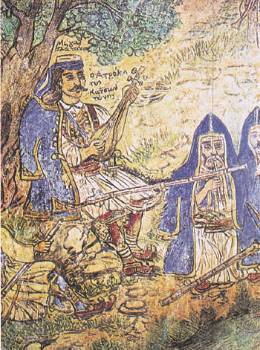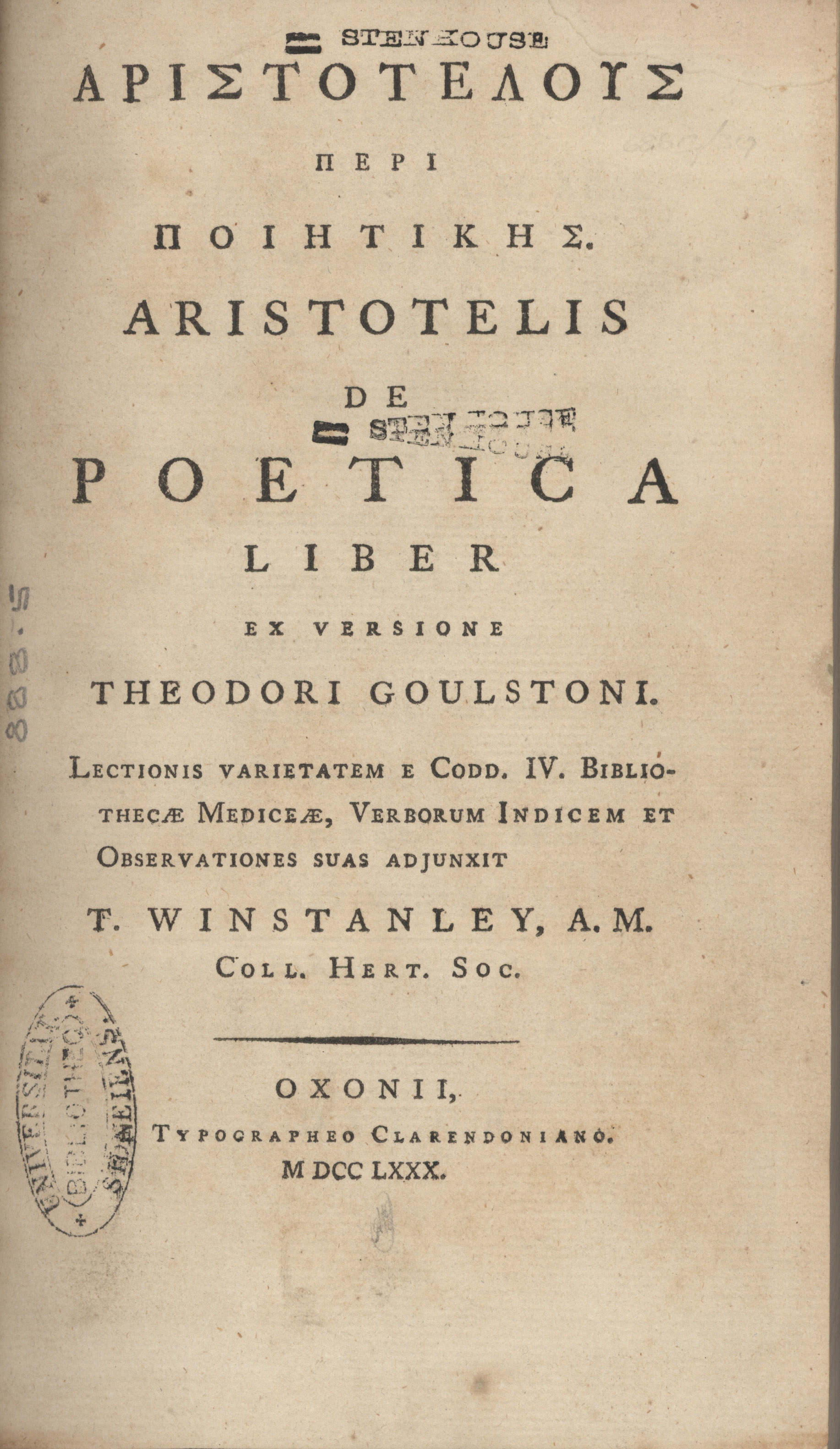|
Armatoles
The armatoles ( el, ОұПҒОјОұП„ОҝО»ОҝОҜ, armatoloi; sq, armatolГ«; rup, armatoli; bs, armatoli), or armatole in singular ( el, ОұПҒОјОұП„ОҝО»ПҢПӮ, armatolos; sq, armatol; rup, armatol; bs, armatola), were Christian irregular soldiers, or militia, commissioned by the Ottomans to enforce the Sultan's authority within an administrative district called an Armatoliki ( in singular, , in plural). In Greek regions of the Ottoman Empire, they were composed of Greeks who were either former klephts or village stalwarts who had taken up arms against the klephts in the defense of their district. The Greek armatoles had a semi-independent status all over the Greek peninsula, and armatolikia were created in areas that had high levels of brigandage (i.e. klephts), or in regions that were difficult for Ottoman authorities to govern due to the inaccessible terrain, such as the Agrafa mountains of Thessaly, where the first armatoliki was established in the 15th century. Over time, the role ... [...More Info...] [...Related Items...] OR: [Wikipedia] [Google] [Baidu] |
Klephts
Klephts (; Greek ОәО»ОӯПҶП„О·ПӮ, ''klГ©ftis'', pl. ОәО»ОӯПҶП„ОөПӮ, ''klГ©ftes'', which means "thieves" and perhaps originally meant just "brigand": "Other Greeks, taking to the mountains, became unofficial, self-appointed armatoles and were known as klephts (from the Greek ''kleptes'', "brigand").") were highwaymen turned self-appointed armatoloi, anti-Ottoman insurgents, and warlike mountain-folk who lived in the countryside when Greece was a part of the Ottoman Empire. They were the descendants of Greeks who retreated into the mountains during the 15th century in order to avoid Ottoman rule.: "The klephts were descendants of Greeks who fled into the mountains to avoid the Turks in the fifteenth century and who remained active as brigands into the nineteenth century." They carried on a continuous war against Ottoman rule and remained active as brigands until the 19th century. The terms kleptomania and kleptocracy are derived from the same Greek root, ОәО»ОӯПҖП„ОөО№ОҪ (''klГ©pte ... [...More Info...] [...Related Items...] OR: [Wikipedia] [Google] [Baidu] |
Klepht
Klephts (; Greek ОәО»ОӯПҶП„О·ПӮ, ''klГ©ftis'', pl. ОәО»ОӯПҶП„ОөПӮ, ''klГ©ftes'', which means "thieves" and perhaps originally meant just "brigand": "Other Greeks, taking to the mountains, became unofficial, self-appointed armatoles and were known as klephts (from the Greek ''kleptes'', "brigand").") were highwaymen turned self-appointed armatoloi, anti-Ottoman insurgents, and warlike mountain-folk who lived in the countryside when Greece was a part of the Ottoman Empire. They were the descendants of Greeks who retreated into the mountains during the 15th century in order to avoid Ottoman rule.: "The klephts were descendants of Greeks who fled into the mountains to avoid the Turks in the fifteenth century and who remained active as brigands into the nineteenth century." They carried on a continuous war against Ottoman rule and remained active as brigands until the 19th century. The terms kleptomania and kleptocracy are derived from the same Greek root, ОәО»ОӯПҖП„ОөО№ОҪ (''klГ©pte ... [...More Info...] [...Related Items...] OR: [Wikipedia] [Google] [Baidu] |
Klepht
Klephts (; Greek ОәО»ОӯПҶП„О·ПӮ, ''klГ©ftis'', pl. ОәО»ОӯПҶП„ОөПӮ, ''klГ©ftes'', which means "thieves" and perhaps originally meant just "brigand": "Other Greeks, taking to the mountains, became unofficial, self-appointed armatoles and were known as klephts (from the Greek ''kleptes'', "brigand").") were highwaymen turned self-appointed armatoloi, anti-Ottoman insurgents, and warlike mountain-folk who lived in the countryside when Greece was a part of the Ottoman Empire. They were the descendants of Greeks who retreated into the mountains during the 15th century in order to avoid Ottoman rule.: "The klephts were descendants of Greeks who fled into the mountains to avoid the Turks in the fifteenth century and who remained active as brigands into the nineteenth century." They carried on a continuous war against Ottoman rule and remained active as brigands until the 19th century. The terms kleptomania and kleptocracy are derived from the same Greek root, ОәО»ОӯПҖП„ОөО№ОҪ (''klГ©pte ... [...More Info...] [...Related Items...] OR: [Wikipedia] [Google] [Baidu] |
Greek War Of Independence
The Greek War of Independence, also known as the Greek Revolution or the Greek Revolution of 1821, was a successful war of independence by Greek revolutionaries against the Ottoman Empire between 1821 and 1829. The Greeks were later assisted by the British Empire, Bourbon Restoration in France, Kingdom of France, and the Russian Empire, while the Ottomans were aided by their North African vassals, particularly the eyalet of Egypt Eyalet, Egypt. The war led to the formation of modern Greece. The revolution is Celebration of the Greek Revolution, celebrated by Greeks around the world as Greek Independence Day, independence day on 25 March. Greece, with the exception of the Ionian Islands, came under Ottoman rule in the 15th century, in the decades before and after the fall of Constantinople. During the following centuries, there were sporadic but unsuccessful Ottoman Greece#Uprisings before 1821, Greek uprisings against Ottoman rule. In 1814, a secret organization called Filiki Et ... [...More Info...] [...Related Items...] OR: [Wikipedia] [Google] [Baidu] |
Feudalism
Feudalism, also known as the feudal system, was the combination of the legal, economic, military, cultural and political customs that flourished in medieval Europe between the 9th and 15th centuries. Broadly defined, it was a way of structuring society around relationships that were derived from the holding of land in exchange for service or labour. Although it is derived from the Latin word ''feodum'' or ''feudum'' (fief), which was used during the Medieval period, the term ''feudalism'' and the system which it describes were not conceived of as a formal political system by the people who lived during the Middle Ages. The classic definition, by François Louis Ganshof (1944), François Louis Ganshof (1944). ''Qu'est-ce que la féodalité''. Translated into English by Philip Grierson as ''Feudalism'', with a foreword by F. M. Stenton, 1st ed.: New York and London, 1952; 2nd ed: 1961; 3rd ed.: 1976. describes a set of reciprocal legal and military obligations which existed am ... [...More Info...] [...Related Items...] OR: [Wikipedia] [Google] [Baidu] |
Greek Language
Greek ( el, label=Modern Greek, О•О»О»О·ОҪО№ОәО¬, EllinikГЎ, ; grc, бјҷО»О»О·ОҪО№ОәО®, HellД“nikбё—) is an independent branch of the Indo-European family of languages, native to Greece, Cyprus, southern Italy (Calabria and Salento), southern Albania, and other regions of the Balkans, the Black Sea coast, Asia Minor, and the Eastern Mediterranean. It has the longest documented history of any Indo-European language, spanning at least 3,400 years of written records. Its writing system is the Greek alphabet, which has been used for approximately 2,800 years; previously, Greek was recorded in writing systems such as Linear B and the Cypriot syllabary. The alphabet arose from the Phoenician script and was in turn the basis of the Latin, Cyrillic, Armenian, Coptic, Gothic, and many other writing systems. The Greek language holds a very important place in the history of the Western world. Beginning with the epics of Homer, ancient Greek literature includes many works of lasting impo ... [...More Info...] [...Related Items...] OR: [Wikipedia] [Google] [Baidu] |
Hamartia
The term ''hamartia'' derives from the Greek , from ''hamartГЎnein'', which means "to miss the mark" or "to err". It is most often associated with Greek tragedy, although it is also used in Christian theology. The term is often said to depict the flaws or defects of a character and portraying these as the reason of a potential downfall. However, other critics point to the term's derivation and say that it refers only to a tragic but random accident or mistake, with devastating consequences but with no judgment implied as to the character. Definition ''Hamartia'' as it pertains to dramatic literature was first used by Aristotle in his ''Poetics (Aristotle), Poetics''. In tragedy, ''hamartia'' is commonly understood to refer to the protagonist, protagonist's error that leads to a chain of actions which culminate in a reversal of events from felicity to disaster. What qualifies as the error or flaw varies, and can include an error resulting from ignorance, an error of judgment, ... [...More Info...] [...Related Items...] OR: [Wikipedia] [Google] [Baidu] |
Byzantine Greece
Byzantine Greece has a history that mainly coincides with that of the Byzantine Empire itself. Background: Roman Greece The Greek peninsula became a Roman protectorate in 146 BC, and the Aegean islands were added to this territory in 133 BC. Athens and other Greek cities revolted in 88 BC, and the peninsula was crushed by the Roman general Sulla. The Roman civil wars devastated the land even further, until Augustus organized the peninsula as the province of Achaea in 27 BC. Greece was a typical eastern province of the Roman Empire. The Romans sent colonists there and contributed new buildings to its cities, especially in the Agora of Athens, where the Agrippeia of Marcus Agrippa, the Library of Titus Flavius Pantaenus, and the Tower of the Winds, among others, were built. Romans tended to be philohellenic and Greeks were generally loyal to Rome. Life in Greece continued under the Roman Empire much the same as it had previously, and Greek continued to be the lingua franca in ... [...More Info...] [...Related Items...] OR: [Wikipedia] [Google] [Baidu] |
Haag Carl - Greek Warrior - Google Art Project
Haag is a common Germanic place-name and personal name, which originally meant "hedge" or "fence", hence "enclosed area", such as a fenced hamlet, park or wood. Also Hagen (other), Hagen, HГӨgen. Haag may refer to: Places *The Hague, in the Netherlands ( nl, Den Haag) *Several places in Germany: **Haag, Upper Franconia in the district of Bayreuth, Bavaria (Postcode 95473) **Haag an der Amper in the district of Freising, Bavaria (Postcode 85410) **Haag in Oberbayern in the district of MГјhldorf, Bavaria (Postcode 83527) **Haag (Oberpfalz), near Hemau, Bavaria (Postcode 93155) **Haag (HunsrГјck), part of the community of Morbach, Rhineland-Palatinate (Postcode 54497) **Haag (Dachau), a village belonging to AltomГјnster in the district of Dachau, Bavaria (Postcode 85250) **Schloss Haag, a castle near Geldern, NRW (Postcode 47608) **Haag (Sinntal), a hill in Hesse *Several places in Austria: **Haag am Hausruck, a market town in the district of Grieskirchen, Upper Austria (P ... [...More Info...] [...Related Items...] OR: [Wikipedia] [Google] [Baidu] |
Murad II
Murad II ( ota, Щ…ШұШ§ШҜ Ш«Ш§ЩҶЩү, MurДҒd-Дұ sДҒnД«, tr, II. Murad, 16 June 1404 вҖ“ 3 February 1451) was the sultan of the Ottoman Empire from 1421 to 1444 and again from 1446 to 1451. Murad II's reign was a period of important economic development. Trade increased and Ottoman cities expanded considerably. In 1432, the traveller Bertrandon de la BroquiГЁre noted that Ottoman annual revenue had risen to 2,500,000 ducats, and that if Murad II had used all available resources he could easily have invaded Europe. Early life Murad was born in June 1404 (or 1403) to Sultan Mehmed I. The identity of his mother is disputed. According to 15th century historian ЕһГјkrullah, Murad's mother was a concubine. HГјseyin HГјsГўmeddin Yasar, an early 20th century historian, wrote in his work ''Amasya Tarihi'', that his mother was Еһehzade Hatun, daughter of Divitdar Ahmed Pasha. According to historians Д°smail Hami DaniЕҹmend, and Heath W. Lowry, his mother was Emine Hatun, daughter of Еһab ... [...More Info...] [...Related Items...] OR: [Wikipedia] [Google] [Baidu] |
University Of Northern British Columbia
The University of Northern British Columbia (UNBC) is a small, research-intensive public university in British Columbia, Canada. The main campus is located in Prince George, with additional campuses located in Prince Rupert, Terrace, Quesnel, and Fort St. John. Because of its northern latitude, UNBC is a member of the University of the Arctic. In the 2020вҖ“21 academic year, 4,253 students were enrolled at UNBC. In 2022, ''Maclean's'' magazine ranked UNBC as the number one university of its size in Canada, in the Primarily Undergraduate category. UNBC also finished first in the rankings in 2015 and 2016 and routinely finishes in the top three in its category. In 2023, UNBC placed second in its category. In 2007, the university obtained the trademark for "Canada's Green University". History In response to a grass-roots movement spearheaded by the Interior University Society, the Legislative Assembly of British Columbia established the university when it passed Bill 40, the Univer ... [...More Info...] [...Related Items...] OR: [Wikipedia] [Google] [Baidu] |






